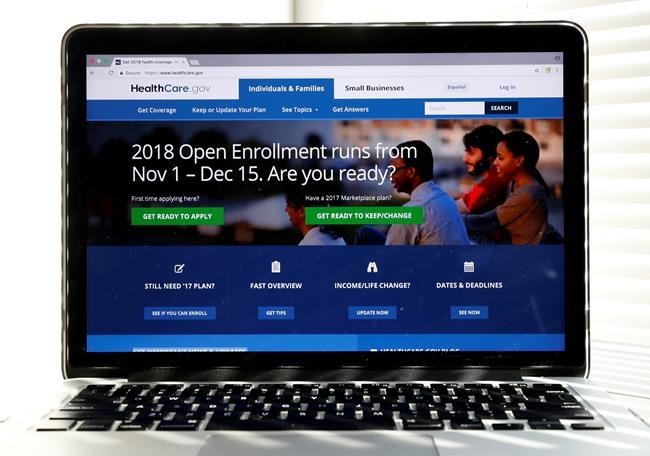
In this Oct. 18, 2017 photo, the Healthcare.gov website is seen on a computer screen in Washington. The government says sign-ups for the Affordable Care Act’s subsidized health insurance are still rising. But with just over a week to go in an enrollment season that was cut in half, experts say the final tally is likely to fall short. (AP Photo/Alex Brandon)
Republished December 06, 2017 - 12:32 PM
Original Publication Date December 06, 2017 - 7:46 AM
WASHINGTON - Americans are signing up in growing numbers for the Affordable Care Act's subsidized health insurance, the government said Wednesday. But with enrolment season cut in half and just over a week to go, experts say the final tally will likely fall short.
About 3.6 million people signed up through Dec. 2 in states served by the federal HealthCare.gov website, according to the Centers for Medicare and Medicaid Services. That's about 20 per cent higher than the comparable period last year.
But it may not be enough. Why not? This year's open enrolment ends Dec. 15, and last time it continued through Jan. 31.
Barring an unusually strong final surge, experts say it's unlikely that enrolment for 2018 will match the initial 12.2 million sign-ups for this year.
It's been a tumultuous year for the health care program passed under former President Barack Obama. The law expanded coverage and helped drive the nation's uninsured rate to a historic low of about 9 per cent. Although President Donald Trump and the Republican-led Congress set out to repeal "Obamacare," repeated attempts have ended in failure.
Still, the Trump administration cut the enrolment season in half, saying that would actually benefit the ACA by bringing it in line with other health insurance programs. At the same time, the administration slashed the advertising budget for 2018 from $100 million to $10 million and cut funding for enrolment assistance.
Disappointing sign-ups will set off another round of political blame over health care, with Democrats accusing the administration of "sabotage" and Republicans saying "Obamacare" is deeply flawed. Trump says it's "imploding."
"It's almost certain enrolment will end lower, and potentially much lower," said Caroline Pearson of the health care consulting firm Avalere Health, which tracks the ACA's insurance markets. "The problem is ... the healthiest people are the ones who don't sign up when enrolment drops."
That feeds a vicious cycle of rising premiums, lower enrolment and dwindling insurer participation.
There are some caveats, including factors that tend to raise enrolment:
— The latest numbers are just for the 39 states served by the federal health insurance website. States running their own health care markets have later deadlines. Big states like California and New York could boost the final count, which isn't likely to be available for weeks.
— The final figure could also be raised by the number of people automatically re-enrolled in the plan they had for this year. That statistic isn't revealed until the very end of sign-up season.
Former Obama administration official Lori Lodes said she believes if sign-up season hadn't been cut short, the ACA would have surprised naysayers with a strong performance.
"The demand is just so big this year, but there's little time left," Lodes said.
But the Trump administration is defending its decision to shorten open enrolment, saying Obama had planned to follow the same schedule — only commencing a year later, for 2019.
Spokesman Nathan Bult said a shorter enrolment window benefits the program because consumers who sign up by the deadline are guaranteed coverage starting Jan. 1.
The shorter period also nudges healthy procrastinators who might have tried to sign up later on to enrol for a full year, Bult said. And it reduces opportunities for people to try to enrol only after they get sick, which can drive up premiums for everyone else.
But independent analyst Larry Levitt of the Kaiser Family Foundation said the administration cut promotional advertising too deeply even as it made a big deadline change for consumers.
"Where the Trump administration deserves some blame is the combination of a shorter open enrolment period and much less outreach," said Levitt. "You probably needed a significant amount of outreach to make sure consumers got in the door."
News from © The Associated Press, 2017